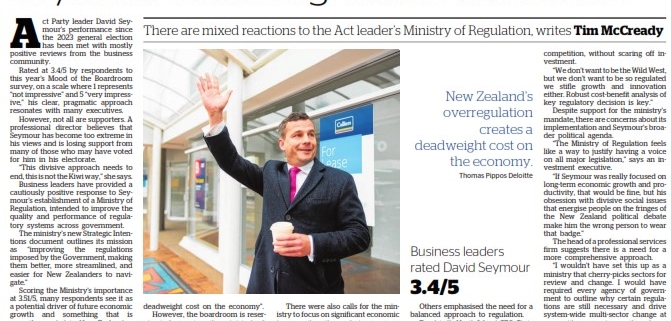Mood of the Boardroom: Act Party leader David Seymour strikes right note with CEOs (NZ Herald)
Mood of the Boardroom: Act Party leader David Seymour strikes right note with CEOs (NZ Herald)
Act Party leader David Seymour’s performance since the 2023 general election has been met with mostly positive reviews from the business community.
Rated at 3.4/5 by respondents to this year’s Mood of the Boardroom survey, on a scale where 1 represents “not impressive” and 5 “very impressive,” his clear, pragmatic approach resonates with many executives.
However, not all are supporters.
A professional director believes Seymour has become too extreme in his views and is losing support from many of those who may have voted for him in his electorate.
“This divisive approach needs to end; this is not the Kiwi way,” she says.
Business leaders have provided a cautiously positive response to Seymour’s establishment of a Ministry of Regulation, intended to improve the quality and performance of regulatory systems across the government.
The ministry’s new Strategic Intentions document outlines its mission as “improving the regulations imposed by the Government, making them better, more streamlined, and easier for New Zealanders to navigate.”
Scoring the ministry’s importance at 3.51/5, many respondents see it as a potential driver of future economic growth and something that is urgently needed in New Zealand.
“Cut the red tape and let us get on with turning the economy around,” comments a logistics boss.
A professional director acknowledges that “intelligent management of regulation is very challenging but critically important”.
Deloitte chair Thomas Pippos echoes this sentiment, noting that New Zealand’s over-regulation “creates a deadweight cost on the economy”.
However, the boardroom is reserving judgment on the ministry’s effectiveness, citing a lack of progress.
“It is important, but it hasn’t achieved anything yet — there should have been some quick wins by now,” says a professional director.
An infrastructure executive agrees, stating: “It is moving too slow and needs to act with more urgency. Bureaucracy is costing New Zealand a significant amount.”
There were also calls for the ministry to focus on significant economic issues rather than what some perceive as minor concerns.
The ministry’s first two sector reviews are currently underway, considering early childhood education and agricultural and horticultural products.
A law firm CEO asks: “Probably important, but hasn’t achieved anything. Why prioritise early childhood education?”
Others emphasised the need for a balanced approach to regulation.
Foodstuffs North Island CEO Chris Quin stresses that regulation is crucial for keeping high standards, ensuring there are safeguards, and making sure everyone is playing fair.
“Good governance gives us credibility and reassures investors that we’re a good place to do business and to invest in,” he says. “The key is striking the right balance — regulation should benefit consumers and boost competition, without scaring off investment.
“We don’t want to be the Wild West, but we don’t want to be so regulated we stifle growth and innovation either. Robust cost-benefit analysis of key regulatory decision is key.”
Despite support for the ministry’s mandate, there are concerns about its implementation and Seymour’s broader political agenda.
“The Ministry of Regulation feels like a way to justify having a voice on all major legislation,” says an investment executive.
“If Seymour was really focused on long-term economic growth and productivity, that would be fine, but his obsession with divisive social issues that energise people on the fringes of the New Zealand political debate make him the wrong person to wear that badge.”
The head of a professional services firm suggests there is a need for a more comprehensive approach.
“I wouldn’t have set this up as a ministry that cherry-picks sectors for review and change. I would have required every agency of government to outline why certain regulations are still necessary and drive system-wide multi-sector change at pace with economic growth and productivity the determining factor.”
There has also been criticism over the ministry’s average salary of $154,500 for its staff, which some view as contrary to the coalition Government’s pledge to reduce back-office spending.
“I am truly appalled at the news of pay rates within the ministry,” a public sector CEO says.



